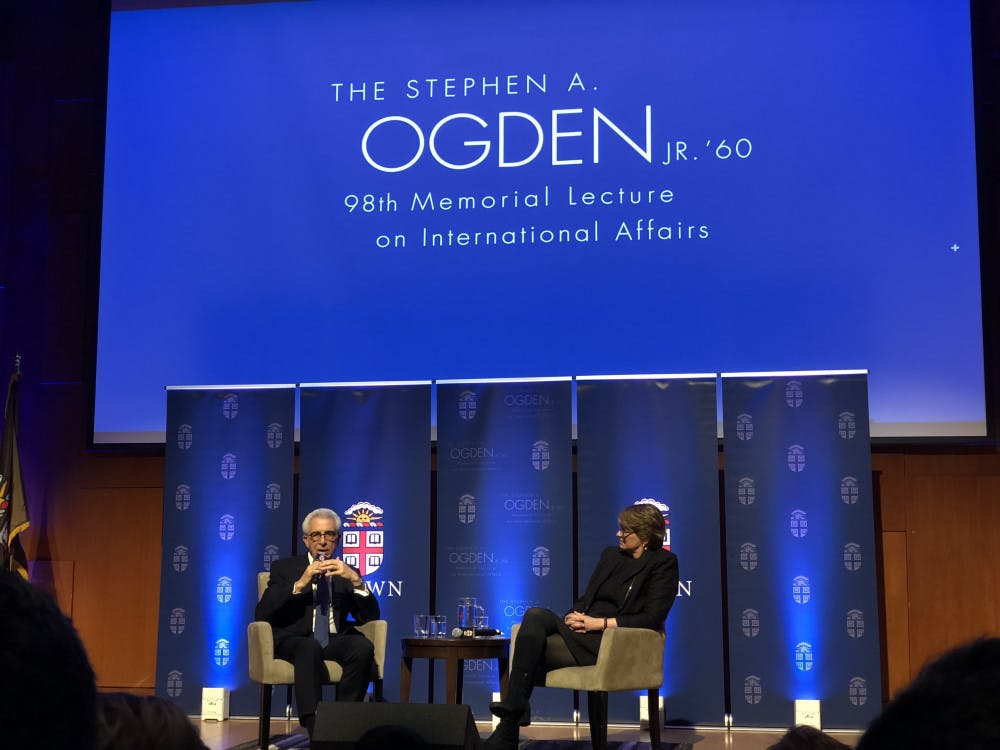As Former President of Mexico Ernesto Zedillo spoke on globalism and contemporary politics as part of the 89th Ogden Lecture series in Salomon Hall Monday night, he explained that “this episode of American mercantilism can hardly have a happy ending simply because it has been launched on many wrong premises.” Zedillo served in Mexico’s highest office from 1994 until 2000 and is currently the director of the Yale Center for the Study of Globalization.
Entitled “Challenging the Challengers of Globalization,” Zedillo’s talk focused on how international trade and diplomacy can foster prosperity for all and allow for rapid growth, particularly in developing countries.
During his speech, Zedillo addressed many concerns associated with globalization, and explained how it factored into the economic crisis of 2008. Zedillo argued that “global macroeconomic imbalances” had a strong influence in the crisis, pointing to economic disparity between Germany and some of its southern European counterparts, including Greece. To remedy this state of affairs, there is a “need for more, not less macro policy coordination.”
Zedillo also discussed the North American Free Trade Agreement, which was signed by former President Bill Clinton while Zedillo was in office. Previously, Zedillo has criticized NAFTA negotiations under President Trump and the recent formation of the United States-Mexico-Canada Agreement. Zedillo stated that the U.S. tended to “demand unreasonably, negotiate aggressively, make any deal, declare victory and move on,” through these trade talks. Commending Canada and Mexico for “attaching very clearly to some principles,” Zedillo told The Herald that the new deal was not a good one, but was “not as destructive as it could have been.” Renaming the treaty was “childish” and “regrettable,” Zedillo told The Herald, not because the United States’ name is first, but because “free trade” was left out of its title.
Despite vigorous support for globalization, Zedillo acknowledged the potential negative impacts it can have foreconomies, such as wealth inequality . “It is well established that as any economic phenomenon in part driven by markets and competition, globalization has downsides notwithstanding its significant upsides,” Zedillo told The Herald. “Those downsides are magnified by some people, by demagogues and populists, to blame all problems existing in a society on foreign forces. … It is basically a political expedient.”
Zedillo explained that though growth has been slower in richer, more developed countries, the United States has still benefited greatly from global trade and investment today and in the past.
In addition to discussing global economic issues, Zedillo spoke to The Herald about the lack of global thinking present incurrent U.S. policy toward migration, explaining that a large part of the problem is that it is “still considered a unilateral issue.” Zedillo said that he was frustrated that the United States withdrew from international migration talks facilitated by the United Nations this past year.
Following the lecture, Zedillo took questions from students and President Christina Paxson P’19, who moderated the talk.
Jimena Terrazas Lozano ’19.5, who identified herself as a Mexican citizen with indigenous ancestry, asked Zedillo about clashes between the government and indigenous people who didn’t agree with his “neoliberal” policies toward NAFTA during his administration. She stated that the conflict resulted in the mass killings of indigenous people and asked how Zedillo tried to balance his economic policies and human rights.
Zedillo said that during his administration he tried to expand economic growth through the resources Mexico had, while also increasing social expenditures, especially for indigenous people, while he was in office.
“I knew that I didn’t agree with Zedillo’s policies, but I came because I believe in the power of listening and understanding,” Lozano told The Herald. “During his administration, the Mexican government really prioritized economic growth over minorities’ well being.”
Alexandra Martinez ’22 said the question-and-answer session helped define who Zedillo was during his presidency and humanized him. She explained she attended the event “to get to know a little bit about my heritage, his presidency and learn a little bit more about globalization.”





